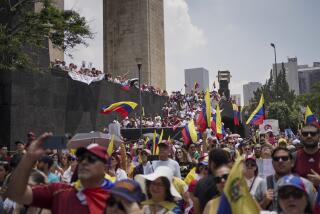INSURRECTION IN PANAMA : For Opposition Leader, Heady News, Then a Letdown
- Share via
NEW YORK — In an 18th-floor mid-Manhattan hotel room, Guillermo (Billy) Ford, the opposition vice president-elect of Panama, sat on a white cloth couch, chain-smoking and placing calls home Tuesday to members of his political party. He was anxiously trying to find out if the military coup against Gen. Manuel A. Noriega had succeeded.
“We’ve been fighting this system for the last 21 years, and this monster for the last two years,” Ford said, his tie loosened, uneaten food from room service on a nearby cart. “We have been on a head-on collision course, and I sincerely hope he does not consolidate his control.
“We’re asking our people to stay away from the streets and to play it cool, avoiding a confrontation with the Defense Forces because there will be a massacre.”
The opposition politician said his party still believes in peaceful change even though its presidential candidate, Guillermo Endara, was beaten unconscious by Noriega supporters during Panama’s election campaign last May.
Peaceful Direction
“We have not used violence whatsoever since the campaign started, and we will continue in that direction,” Ford said. “Noriega’s followers are very eager to have us confront the Defense Forces.”
Ford first received word that an attempted coup was under way in a phone call from Panama to his hotel room shortly before he was scheduled to speak at Columbia University’s School of International and Public Affairs. The details were sketchy, but the news was electrifying. Similar calls were made to Panamanian exiles in Washington and Miami.
“I had a phone call that there was some unconfirmed shooting at the headquarters of the police department, the Defense Forces, and then I got more and more calls and it was confirmed,” Ford said. “We had people around the area who could really give us the facts. . . . It is a group of young officers, captains and lieutenants, majors. The lower levels revolted.”
Pursued by the press and possessing only fragmentary information, Ford spoke at the university, where he periodically phoned Panama. Meanwhile, a small group of Noriega’s opponents gathered outside the United Nations to protest a speech before the General Assembly by Panama’s provisional president, Francisco Rodriguez, a staunch Noriega supporter.
Some of these demonstrators also had received reports of confusion and bloodshed from relatives in Panama. They rejoiced at an initial announcement: The entire high command had been forced into retirement by middle-ranking officers, and Noriega’s whereabouts were unknown.
“I am very cautious. I’m optimistic. They have tried this before,” said Camela Rodriguez, a bank employee and one of the protesters.
“Noriega must go,” other demonstrators holding up signs chanted. One sign read, “The canal for Panama, si, for the drug traffickers, no.”
Noriega’s difficulties with the United States came into the open in February, 1988, when he was indicted by federal grand juries in Florida on drug-trafficking charges.
Almost an hour after the protesters had gathered across First Avenue from the United Nations, Ford arrived by car. He was immediately surrounded by almost two dozen reporters--easily twice the number of demonstrators.
“We are the members of the opposition who won the election on May 7,” Ford said. “He (Rodriguez) will not be speaking as a representative of the Panamanian people.”
He then retreated to his hotel room to try to reach members of his political party. He found his wife using the phone. “Mommy, get off the phone,” Ford urged, and his wife quickly complied.
‘Lot of Confusion’
“There is a a lot of confusion,” Ford said after speaking to a politician back home. He said that Endara had been taken to a safe place.
“The rebels have taken the headquarters, and that is confirmed, and apparently there were helicopters flying over the headquarters, but that is not confirmed. Noriega normally had control of the air force. . . .
“The streets are deserted, by the way, and we have to see the outcome and wait a little longer. It all depends on what kind of support Noriega has and whether it is true he has the support of the armed forces or not.”
Ford said that friends in Panama had told him that all media, except for the official state radio, were blacked out.
The opposition vice president said he had come to the United States not only to protest Rodriguez’s speech at the United Nations but also to lecture on the current political situation in Panama.
Ford said no rumors of a coup had circulated in recent days, and Noriega had been making public appearances about once a week. He said Noriega had warned that if he was ousted, hard-liners even tougher than he might succeed him.
The phone on a table alongside the couch rang again. Ford picked up the receiver. After a brief conversation, his face fell.
“We are hearing the rebels have surrendered,” he said.
That fact was soon confirmed by news reports.
“Just another fight towards democracy,” Ford said. “And it means that Noriega did not have absolute control of the Defense Forces. Not only did some of the members vote for the opposition, they showed they did not like the regime.”
A reporter asked if the opposition vice president-elect planned to return to Panama.
“I am going home,” Ford replied. “I was born in Panama, and Noriega is not going to keep me out of Panama. . . . I am not changing my schedule for Noriega.”
More to Read
Sign up for Essential California
The most important California stories and recommendations in your inbox every morning.
You may occasionally receive promotional content from the Los Angeles Times.











